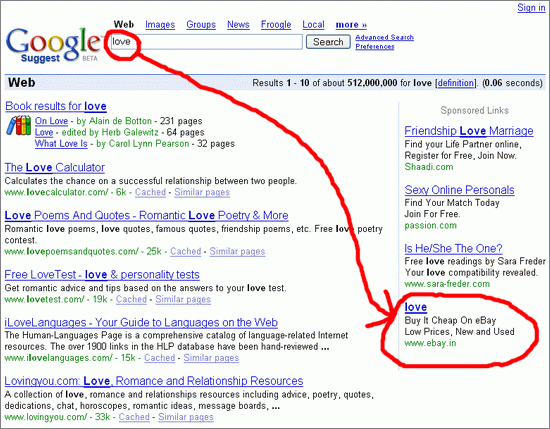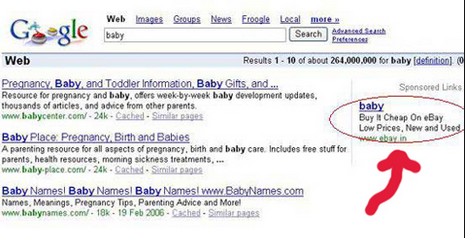Last week, eBay published a report announcing that they would end their Google Adwords campaign, claiming that SEM overall has little to no benefit. Naturally, eBay’s criticism of SEM has stirred up the industry, prompting other marketers to question the effectiveness of paid searches. After eBay stopped their search engine ads in almost a third of their markets, they saw no drop in sales. Does this indicate that SEM services like Google Adwords are not effective? Or is it more about eBay’s marketing approach?
Lessons from eBay’s Experience with Adwords
The facts don’t lie: Adwords had no affect on eBay’s bottom line. However, what’s not so apparent is the fact that eBay didn’t utilize its marketing dollars and strategy to its potential. In the end, Adwords is just a piece of software that doesn’t understand your business – it simply does what you tell it to do. And quite frankly, eBay didn’t tell Google Adwords to do a very good job.
Take a look at the following screenshots that capture eBay’s use of paid advertising:
From eBay’s ads, you’d think that it was possible to purchase love or a baby on eBay! What these examples showcase is eBay’s inefficient use of keywords to promote their business on Adwords. Instead of understanding that Google Adwords is simply a algorithmic software that implements a strategy that you must develop, it seems that eBay simply focused on Dynamic Keyword Insertion instead of creating targeted ads.
Since Adwords allows brands to choose what keywords they advertise through, it can be tempting to jam every keyword possible into a marketing campaign. However, as per eBay’s example, creating a universal template for random keywords is less effective than created targeted ads for targeted traffic.
eBay’s mistakes include:
- Using the same template for each ad. For higher CTRs and ads that are actually relevant to users, customize the ads for the keywords and consumers you are trying to target.
- Bidding on every keyword possible. Now, it’s impossible to tell whether eBay actually bid on every keyword in the dictionary, but they’ve had ads run for strange keywords including: Disgusting, filth, dead animals, farts, dirty thoughts, poop, baby Mexican, athletic sweat, and severed heads. Obviously, no one is ever going to search the internet to purchase those things online – yet eBay’s ads somehow appeared for those searches? To brand marketers: Avoid keyword stuffing and hone-in on your target!
- Targeting frequent eBay buyers. It’s reported that most people who purchase on eBay have purchased at least 3 times on the site before, yet they are still being targeted with eBay’s Adwords campaign. This is part of the reason there was no drop in sales when eBay paused their SEM efforts – they were catering to existing customers, not gaining new ones. To ensure your PPC is reaching its full potential, aim to expose your brand to new consumers, not existing ones unless you’re trying to encourage repeat business.
As one of the largest spenders on Google Adwords, it’s unclear what eBay’s decision will have in the SEM industry – if any. Regardless of their claims, it’s still possible to implement conversion tactics in your PPC campaigns and exponentially gain exposure for your brand with Google Adwords. While eBay is great at handling online auctions, writing online ads isn’t their forte. That’s okay – we still love them! Just don’t be taking SEM or content marketing advice from them anytime soon.
Do you or have you used Google Adwords? If so, we’d love to hear about your experience!
Read more:

